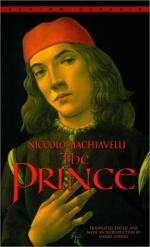|
|
The Prince Objects/Places
republics: A state with a system of government with elected representatives where power is ultimately derived from the people. Machiavelli identifies two types of states: republics and principalities. In The Prince, Machiavelli focuses on principalities because he writes about republics in another work, The Discourses.
principalities: A state with a system of government where power is derived mainly from one primary ruler. Machiavelli identifies three main types of principalities: hereditary, new, and mixed. Hereditary principalities pass down power through the ruling family line. New principalities are created through military or civil acquisition. Mixed principalities are new territories that are added to an existing territory. Machiavelli further identifies four ways a ruler acquires a new principality: by one's own arms, by the arms of others, by evil means, and by civil means. Machiavelli also identifies the ecclesiastical principality as a special case with the pope acting as the political prince.
hectic fever: A disease that is at first hard to diagnose but easy to treat, later it becomes easy to diagnose but impossible to treat. Machiavelli uses hectic fever as an analogy-as hectic fever is to the body, political maladies are to a state. Machiavelli's point: it is important for a ruler to detect a problem and resolve it right away before it becomes impossible to fix.
Church: In Machiavelli's time, the position of the pope and the power of the Church were a force to be reckoned with, both in political and military affairs. Pope Alexander VI and Pope Julius II were instrumental in strengthening the power of the Church. Machiavelli considers the pope to be a special type of a political ruler.
mercenary (forces): Mercenary forces are troops that are hired to fight for a wage. Machiavelli takes a strong stance against the use of mercenary forces. He believes mercenary forces are useless to a ruler because they are undisciplined, cowardly, and without any loyalty. Their only motivation to fight is for pay. Machiavelli attributes Italy's demise to the use of mercenary armies.
auxiliary forces: Auxiliary forces are troops that are borrowed from an ally. Machiavelli warns against using such forces because if they win, the employer is under their favor and if they lose, the employer is ruined. Auxiliary forces are more dangerous than mercenary armies because they are united under their own interests and controlled by capable leaders who may turn against their employers.
fox: The fox is used as a symbol for wisdom and cunning. As a fox is able to recognize traps, a prince must be able to outmaneuver his foes. However, since a fox cannot drive away wolves, it is not enough for a prince to have just fox-like qualities; he must also be like a lion.
lion: The counterpart to the fox, a lion is a symbol for courage and ferocity. As a lion is able to drive away wolves, a prince must be able to stand up against his enemies. However, a lion cannot recognize traps, therefore, a prince must also be like the fox-wise and cunning.
fortresses: A fortress is a type of fortification that allows a ruler to withstand sieges and attacks. Regarding the use of fortifications, Machiavelli advises that a fortress, such as a castle, may or may not be useful depending upon the situation, but relying too much on it is harmful. A fortress will not protect a ruler if he is hated by his people.




